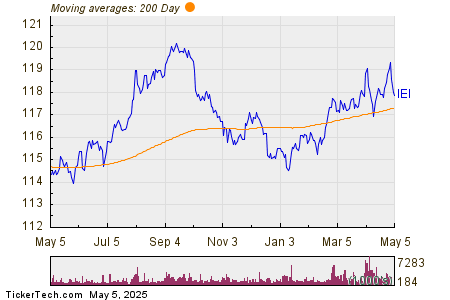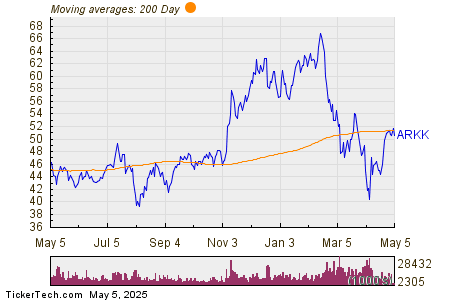Meta Platforms Surges After Strong Q1 Earnings Report
Meta Platforms (NASDAQ: META) surged 4.2% on Thursday following a strong first-quarter earnings report. The company has significantly recovered from its year-to-date losses, bringing its performance close to even for the year.
The latest results, coupled with management’s commentary during the earnings call, strengthen the overall investment thesis for Meta. Many consider it a promising growth Stock to buy now.
Where to invest $1,000 right now? Our analyst team has revealed what they believe are the 10 best stocks to buy right now. Continue »

Image source: Getty Images.
High-Margin Growth from Family of Apps
Meta reported a 16% increase in revenue, with operating income soaring by 27%. This rise occurred alongside only a 9% increase in costs and expenses. The company achieved an impressive operating margin of 41%, converting 41 cents of every revenue dollar into operating income.
Moreover, a disciplined approach to spending resulted in a 35% boost in net income and a 37% rise in diluted earnings per share (EPS). These profitability results highlight a robust business model that drives user engagement and attracts advertisers. Meta’s engagement metric—family daily active people (DAP)—rose by 6% year over year, leading to a 5% increase in ad impressions and a 10% rise in price per ad.
The following chart illustrates how diluted EPS has more than tripled from pre-pandemic levels due to consistent revenue growth and margin expansion:

META Revenue (TTM) data by YCharts.
While the results were strong, the company’s outlook and confidence in long-term investments were particularly reassuring.
Increased Investment in AI
Meta anticipates Q2 2025 revenue in the range of $42.5 billion to $45.5 billion. At the midpoint of $44 billion, this would represent a 12.6% increase from Q2 2024—a challenging comparison as Q2 2024 revenue had already grown by 22% year over year.
The company reduced its full-year expense guidance from $114 billion to $119 billion to $113 billion to $118 billion. However, it raised its 2025 capital expenditures (capex) forecast to between $64 billion and $72 billion, up from a previous estimate of $60 billion to $65 billion.
Most of this capex investment is directed toward artificial intelligence (AI) and essential business functions. Meta is enhancing its infrastructure, like building data centers, to support AI while retaining operational flexibility. Management has noted solid returns from AI initiatives, improving operational efficiency. For instance, AI-driven recommendations have led to a 7% increase in time spent on Facebook and a 6% increase on Instagram.
AI is positively influencing user engagement and enabling advertisers to tailor campaigns to their goals. Notably, on April 29, the day prior to the earnings release, Meta introduced the Meta AI app, utilizing its latest large language model, Llama 4. This app stands apart from AI features integrated within Instagram, Facebook, and WhatsApp, as it offers solutions to problems, answers queries, and provides detailed topic analysis, positioning it as a competitor to ChatGPT and Alphabet‘s Google Search.
Meta’s ongoing growth and increased capex, despite challenging comparisons and a volatile macroeconomic landscape, underscore the efficacy of its business model and commitment to long-term investments in AI and R&D.
The company continues investing in its Reality Labs division, focusing on virtual reality, augmented reality, and metaverse developments. Although the core family of apps segment thrives, Reality Labs recorded an operating loss of $4.2 billion last quarter, contributing to a substantial annual loss of $17.73 billion. Despite these figures, Meta can sustain these losses due to the strong performance of its main apps.
Reality Labs has seen some progress; for example, Ray-Ban Meta AI glasses reported four times the monthly active users compared to a year prior. However, the division remains too inconclusive to be a core part of Meta’s investment strategy.
Returning Capital to Shareholders
Despite extensive capex and ongoing support for the unprofitable Reality Labs division, Meta still allocates considerable resources to shareholder returns. In the most recent quarter, the company invested $13.4 billion in buybacks and $1.33 billion in dividends.
At this rate, Meta could return approximately 4% of its market cap to shareholders throughout the year. If dividends were the sole focus, this would translate to a 4% dividend yield, emphasizing the scale of its return program.
Over time, buybacks have significantly enhanced earnings growth compared to net income. Even with substantial stock-based compensation, Meta has achieved one of the most aggressive share-count reductions among major tech companies. In five years, the company has decreased its share count by 11.4%, surpassing Alphabet’s 10.9% and trailing Apple’s 12.8% reduction.
Consistent buybacks and earnings growth have kept Meta’s valuation reasonable, despite a strong share price. The company’s stock price rose by 152% over five years, yet diluted EPS increased at an even greater pace, resulting in a lower price-to-earnings (P/E) ratio. Currently, Meta’s P/E stands at 22.4, which is low for an industry-leading firm with high margins.
Even more impressively, earnings would be even higher without the billions lost quarterly on Reality Labs. This perspective indicates that Meta’s stock is undervalued.
Meta Platforms: A Strong Growth Investment
Overall, Meta meets all the criteria for a top growth Stock.
# Meta Platforms: A Strong Investment Choice for Growth Investors
The core business of Meta Platforms thrives, generating significant cash flow that supports increased capital expenditures. The company effectively manages its operating expenses, which aids long-term investments and mitigates the impacts of losses from Reality Labs.
Additionally, Meta continues its aggressive stock repurchase strategy, maintaining control over its valuation. The company’s robust balance sheet positions it well to weather economic downturns or seize acquisition opportunities.
Taking these factors into account, Meta Platforms stands out as a compelling investment today. It serves as a foundational option for both growth and value investors looking to diversify their portfolios.
Should You Invest $1,000 in Meta Platforms Right Now?
Before deciding to purchase stock in Meta Platforms, it’s essential to consider the following:
The Motley Fool Stock Advisor analyst team recently identified what they believe are the 10 best stocks for investment, and Meta Platforms is not included in this list. The chosen stocks are forecasted to yield substantial returns in the years ahead.
For example, when Netflix was featured on December 17, 2004, a $1,000 investment then would now be worth $623,685!*
Similarly, had you invested $1,000 in Nvidia on April 15, 2005, that investment would now total $701,781!*
It’s important to note that Stock Advisor has a total average return of 906%, significantly outperforming the 164% return of the S&P 500. Don’t miss the latest top 10 list by joining Stock Advisor.
*Stock Advisor returns as of May 5, 2025.
Suzanne Frey, an executive at Alphabet, serves on The Motley Fool’s board of directors. Randi Zuckerberg, a former director of market development and spokesperson for Facebook, and sister to CEO Mark Zuckerberg, is also a board member. Daniel Foelber holds no positions in the mentioned stocks. The Motley Fool has positions in and recommends Alphabet, Apple, and Meta Platforms. The Motley Fool adheres to a disclosure policy.
The views and opinions expressed herein are those of the author and do not necessarily reflect those of Nasdaq, Inc.



